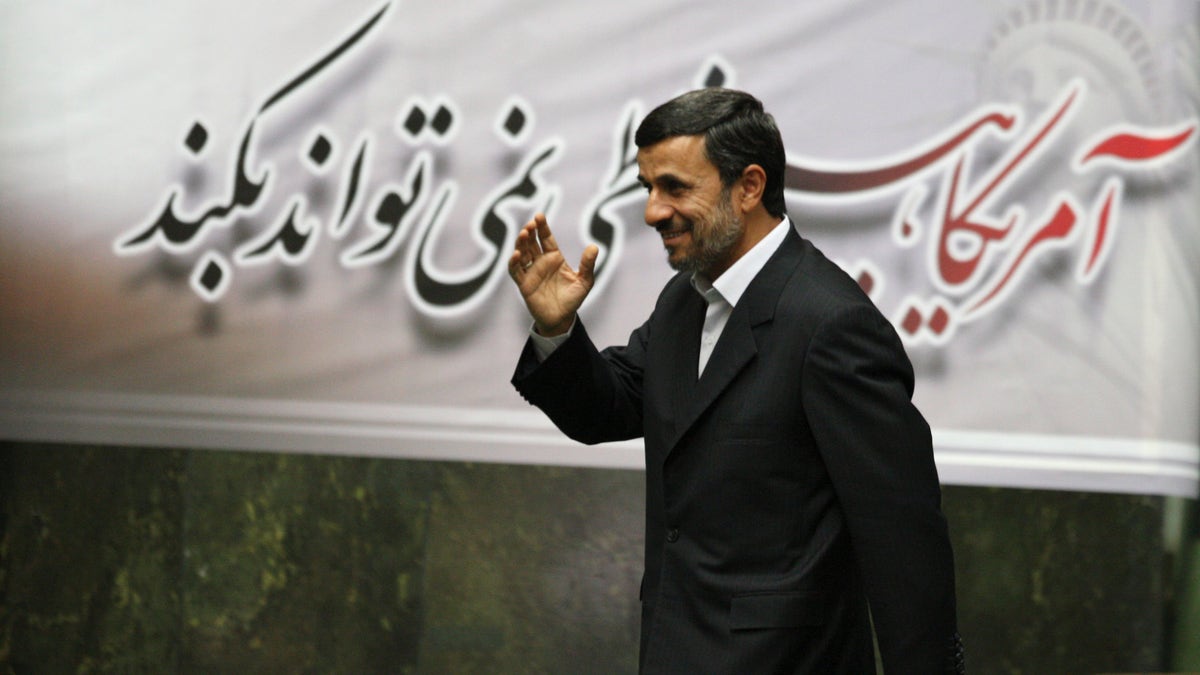
Nov. 2, 2011: Iranian President Mahmoud Ahmadinejad, waves, as he arrives to attend an open session of parliament for impeachment of his Economy Minister, Shamsoddin Hosseini, unseen, as a banner hangs behind him with a quotation of late revolutionary founder Ayatollah Khomeini, which says "US can not do anything", in Tehran, Iran. (AP2011)
TEHRAN, Iran-- A petition to summon President Mahmoud Ahmadinejad to parliament for questioning over a long list of accusations, including corruption, failed Wednesday after some lawmakers withdrew their support for the motion, an Iranian legislator said.
The petition was the latest salvo in a long battle between the president and his rivals and its failure in parliament was a boost for the embattled Ahmadinejad, who has come under increasing attacks in recent months from the same hard-liners who brought him to power.
The power struggle is an internal conflict in Iran in the run-up to parliamentary elections in March 2012 and the 2013 presidential election.
Had the petition succeeded, Ahmadinejad would have been the first Iranian president to be hauled before parliament -- a serious blow to his standing in the conflict involving the president, lawmakers and Iran's powerful clerics.
By Sunday, 73 lawmakers had signed the petition, meeting the constitutional requirement that a quarter of lawmakers in the 290-seat assembly support the bid to call in a president.
But at least three legislators withdrew their signatures Wednesday, effectively killing the motion, at least temporarily, said Mohammad Hossein Farhangi, a prominent lawmaker.
Ali Motahari, a conservative lawmaker behind the petition, accused the government and the assembly's presiding council of pressuring the lawmakers into backing out.
"Some members of the presiding council ... placed the lawmakers under a pair of scissors to pressure them to withdraw their signatures," Motahari told the parliament. "Instead of taking action to move toward summoning the president, the presiding council joined the government to kill the motion."
He did not elaborate. The session was broadcast on state radio.
Parliament speaker Ali Larijani dismissed Motahari's criticism, saying the council "can't be blamed if an individual changes his mind. "
Accusations against Ahmadinejad have ranged from economic misconduct by his allies, including a $2.6 billion fraud case considered the largest in Iran's history, to leading a "deviant current" that seeks to challenge the country's ruling theocracy.
Ahmadinejad also got a boost on Tuesday, when Iran's economy minister, Shamseddin Hosseini, survived a vote in parliament to dismiss him from office over the $2.6 billion bank fraud. The case involved the use of forged documents to obtain credit from at least two Iranian state banks to purchase state-owned companies
Hosseini survived after an unusual intervention on his behalf by Larijani. Ahmadinejad also appealed to parliament to allow him to keep his government intact to deal with international sanctions over Iran's controversial nuclear program.
The U.N has imposed several rounds of sanctions on Iran amid widespread suspicions that Tehran is trying to fashion nuclear weapons. Iran denies that, insisting the program is for peaceful purposes.
Also Wednesday, a 155-31 vote by lawmakers rejected a resignation tendered earlier by Motahari in a protest over the house's failure to summon Ahmadinejad.
Motahari last month said he was quitting because he felt he could no longer represent the people who elected him. He had also said he would withdraw the resignation if the house actually moves to question Ahmadinejad.
